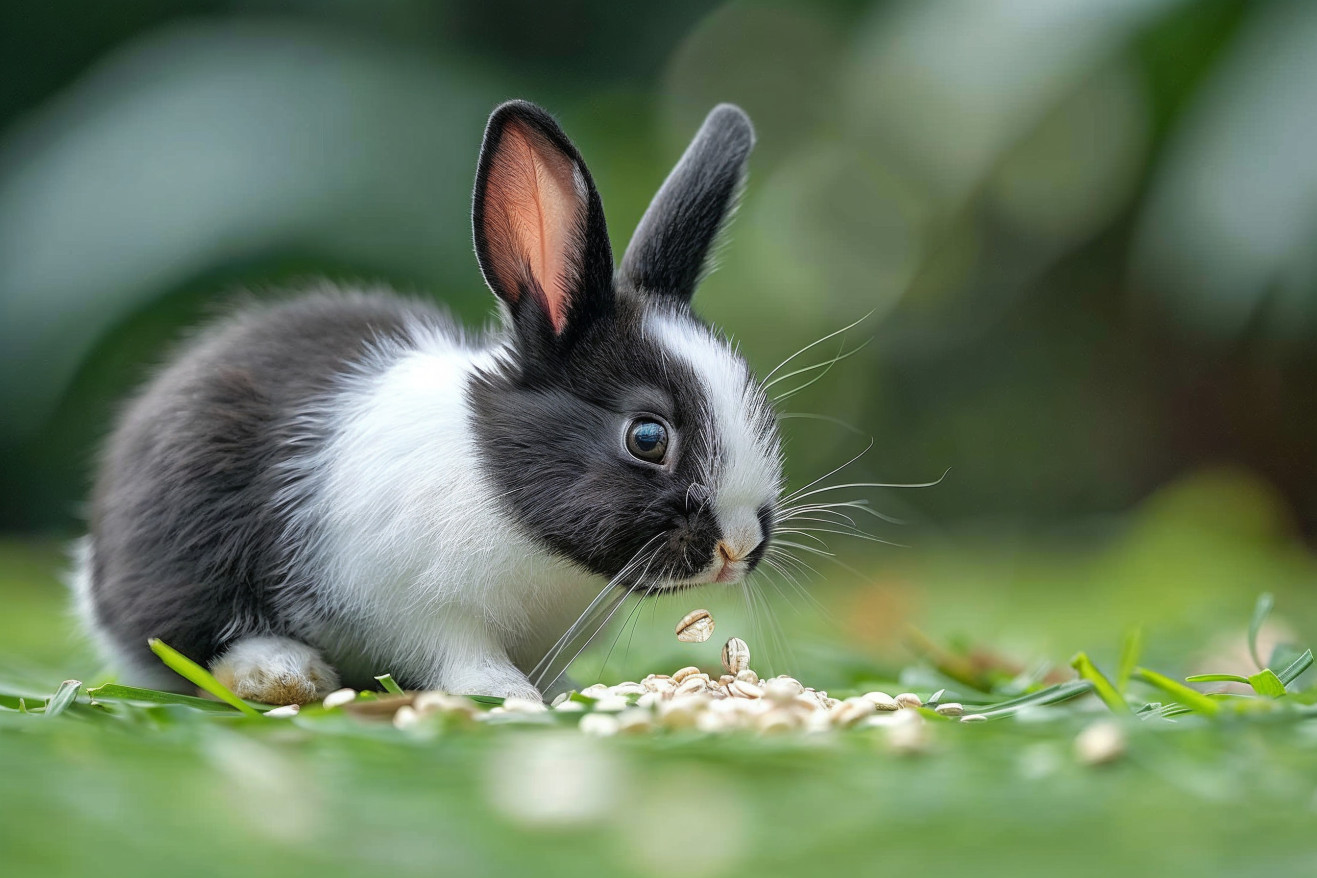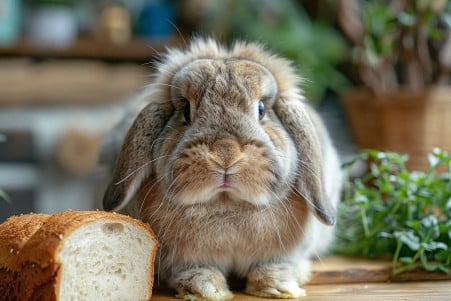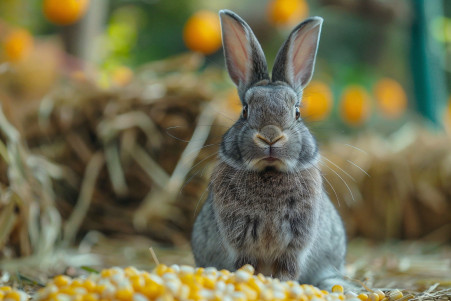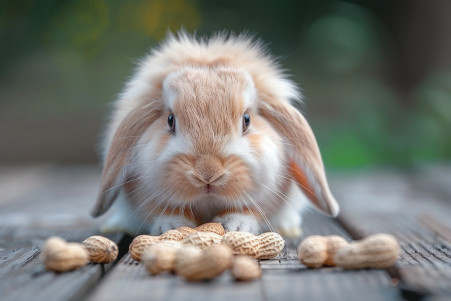Can Rabbits Have Oats? A Vet-Approved Guide to Rabbit Nutrition
14 June 2024 • Updated 13 June 2024

Can you give your pet rabbit a few oats as a snack, or will this common grain cause them to have tummy troubles? While oats are not poisonous to rabbits, they are starchy and can lead to obesity and other digestive issues if rabbits eat too many of them. So, while you can give your rabbit a few oats as a treat, most of their diet should consist of hay, fresh veggies, and rabbit pellets.
To take a deeper dive into this subject, we'll look at the scientific evidence about rabbits' digestive physiology and nutritional requirements. Through an analysis of veterinary research and recommendations, you'll learn how to put together a well-rounded diet for your rabbit that meets their needs. We'll also cover the risks and benefits of oats and other grains, as well as the right serving sizes for your rabbit. This way, you'll be able to make informed choices about your rabbit's diet.
Can rabbits eat oats?
Hay: The Foundation of a Healthy Rabbit Diet
Hay is the cornerstone of a healthy rabbit diet, making up to 90% of their daily food intake and supplying the necessary fiber that rabbits need to stay healthy. The best hay for rabbits includes timothy hay, orchard grass hay, meadow hay, organic oat hay, and teff grass hay.
For adult rabbits, it's important that they have unlimited access to a high-quality grass hay, and many experts recommend timothy hay as the best option. This is because it has a high fiber content that's similar to what rabbits would eat in the wild, which helps keep their teeth healthy and prevents digestive issues like gastrointestinal stasis.
Alfalfa hay has more protein and calcium, but it should only be fed to healthy adult rabbits in limited quantities and as an occasional treat. On the other hand, alfalfa hay can be fed to young, pregnant, and nursing rabbits in unlimited quantities to make sure they get the extra nutrients they need.
Feeding a mix of grass hays will help encourage natural foraging behaviors and ensure that your bunny has a well-rounded diet. It will also help prevent your rabbit from becoming a picky eater and make mealtime more interesting. With hay as the main component of their diet, your rabbit will be eating the fiber-rich food that nature intended.
Healthy Rabbit Treats: Alternatives to Oats
The healthiest rabbit treats are hay-based, such as the Oxbow brand treats. Fresh fruits and veggies are also healthy if given in moderation, with the recommended serving size being about 1 tablespoon per day. Some safe options for rabbits are apples, berries, carrots, leafy greens like arugula, kale, and romaine lettuce, and more.
Baked hay treats and dried herb blends are also among the best healthy treats for rabbits. Dried fruits and veggies can be good treats as long as they are unsweetened. However, rabbits should not be given human foods such as bread, chocolate, dairy, and fried foods, or plants that are toxic to rabbits like avocado, beans, onions, and chocolate.
Nuts, corn, grains, and legumes are also on the list of treats to avoid giving rabbits because they can lead to digestive problems. Treats should be used to encourage enrichment and training, which means they can help rabbits exhibit natural foraging behaviors, but they should not be a substitute for a balanced diet that includes hay and leafy greens.
Oats for Rabbits: How to Practice Portion Control and Moderation
If you decide to give your rabbit oats, it's important to make sure you only give them a very small amount and that you don't give them to your rabbit too often. According to the Rabbit Talk - Meat Rabbit & Farming Forum, the general rule of thumb is that oats should be limited to 1-2 tablespoons per week for an average-sized adult rabbit. Smaller rabbits will need even less to avoid digestive and weight issues.
Oats should also be introduced slowly to make sure your rabbit doesn't have any digestive issues or other problems with them. The Rabbit Haven warns against feeding oatmeal and other grains to rabbits because of the potential for dietary issues. Oats may be helpful for rabbits who are underweight, but you should talk to your vet before giving them to your rabbit.
Raw vs. Cooked Oats: Which Is Best for Rabbits?
Raw oats are generally safer for rabbits than cooked oatmeal, which can be hard for rabbits to digest. The BunSpace.com forum suggests that dried, rolled oats or steel-cut oats are the best types of raw oats to give rabbits as a treat.
On the other hand, PETA says that cooked oatmeal is not good for rabbits because it can cause digestive issues and even lead to gastrointestinal stasis. Meanwhile, some rabbit experts, including those cited by Cannon Beach Bunny Rescue, recommend against feeding rabbits oats on a regular basis, since rabbits should be eating hay, greens, and a small amount of pellets.
If you do decide to give your rabbit oats, it's important to do so in moderation and watch for signs of digestive problems, including changes in eating and litter box habits. Paying close attention to how your rabbit reacts to oats can help you make sure they're safe and healthy.
Potential Dangers and Symptoms of Oat Toxicity in Rabbits
Potential dangers of feeding rabbits oats include obesity, digestive issues, and gastrointestinal stasis, according to PETA. Symptoms of oat toxicity or digestive upset in rabbits include loss of appetite, depression, soft or misshapen fecal droppings, and a lack of interest in hay. If your rabbit shows any of these signs after eating oats, you should stop feeding them oats immediately and contact your vet.
Because oats don't provide the essential nutrients and fiber that rabbits need to stay healthy, the Cannon Beach Bunny Rescue recommends that oats not be a staple in a rabbit's diet. Instead, focus on feeding your rabbit a diet that includes high-quality hay, fresh vegetables, and a small amount of specially formulated rabbit pellets to make sure your bunny's diet is safe and nutritious.
Conclusion: Moderation and Balance for Bunny Health
While oats themselves are not toxic to rabbits, they should be given in moderation as an occasional treat, not as a regular part of their diet. A balanced diet focused on high-quality hay, fresh vegetables, and a small amount of specially formulated rabbit pellets is essential for maintaining a rabbit's overall health and well-being.
Overfeeding oats or relying too heavily on them as a dietary staple can lead to potential risks such as obesity, digestive issues, and gastrointestinal stasis. When introducing new foods like oats to a rabbit's diet, it's crucial to do so gradually and monitor for any adverse reactions or changes in appetite or litter box habits.
Consulting with a veterinarian is recommended, especially for underweight rabbits or those with specific dietary needs, to ensure a safe and appropriate incorporation of oats or other treats into their nutrition plan.


